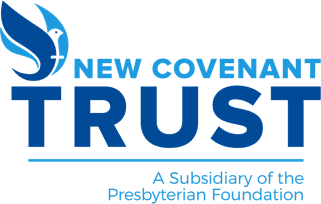
In a time of market swings and global uncertainty, New Covenant Trust Company (NCTC) hosted a free webinar that explored how investors can remain faithful stewards in volatile markets.
The webinar, “Faithful Investing in Uncertain Times,” opened with Rev. Erin Skinner, Ministry Relations Officer for the Presbyterian Foundation, who welcomed participants and offered a brief reflection and blessing before introducing the day’s speakers — NCTC’s Angela Duffy, James Carey and Brad Masters.
Sharing NCTC’s Mission
Angela Duffy, President & CEO, began with an overview of the company’s mission and structure, noting that as a wholly owned subsidiary of the Presbyterian Foundation, NCTC was created in the late 1990s to provide flexible, values-based financial and trust services for both church organizations and church members.
“We can tailor our investment approach to each client — everything from investment selections to spending formulas to serving as a trustee,” she said.
As a federally regulated trust bank examined every 18 months by the Office of the Comptroller of the Currency, NCTC manages about $850 million for about 450 clients nationwide and regularly returns profits to the Foundation via dividends to support the Foundation’s broader mission.
“Our focus is on you — not us,” Duffy added. “We want to take really good care of all of our clients, no matter the asset size.”
Expect the Unexpected
James Carey, VP for Investments and Portfolio Management, then offered a wide-ranging discussion of the markets and investing fundamentals.
He began with a simple theme: Expect the unexpected.
“Most of all, it’s important that investors know that risk is elevated,” Carey said. “We may get sudden reversals, unexpected policy shifts, even an impactful tweet. The key is to anticipate volatility and not be panicked by it.”
He reminded attendees that market turbulence is normal, and that staying grounded in investment fundamentals is critical. “The fundamentals of investing are going to help you in good times and in more difficult times,” he said.
Carey described NCTC’s evidence-based investment philosophy — one that relies on long-term data rather than gut instinct or short-term speculation. Historical evidence, he explained, shows that most professional stock pickers fail to outperform the overall market over time.
“In many of these asset classes, you only had about a 3-in-100 chance of selecting a manager that actually outperformed the benchmark over a 20-year period,” he noted, referencing a recent S&P Dow Jones SPIVA report.
Instead of chasing returns, Carey urged investors to focus on asset allocation — the mix between stocks, bonds and cash — which explains about 90% of long-term results. Getting that balance right, he said, is one of the most impactful but often ignored aspects of building a great portfolio.
Focus on Goals and Discipline
Carey encouraged participants to start discerning an efficient asset allocation by answering two questions: What do I want this money to do? and, When will I need to spend this money? In other words, investors need to determine their goals and their time horizon. From there, portfolios can be organized along the spectrum of risk and return, as well as time horizon — keeping short-term funds in safer vehicles like cash or CDs while allowing long-term assets to grow through diversified investments.
He also emphasized the importance of emotional discipline, noting that human nature often works against good investing. “Humans are hardwired pretty naturally to be terrible investors,” Carey said, explaining that when people hear about others making big gains — “our brother-in-law doing so well with his cryptocurrency,” for example — they tend to feel the fear of missing out and buy when prices are high.
Later, when markets fall and fear sets in, many investors sell in panic, incurring losses. Carey pointed to Morningstar’s annual investor gap study, which shows that individual investors consistently earn less than the funds they invest in because of this buy-high, sell-low behavior.
Remaining disciplined through market ups and downs, he said, is one of the surest ways to improve long-term outcomes. Carey advised investors to set clear goals, establish an appropriate asset allocation, document it in a written investment policy statement and remain committed through market cycles.
“Investing is one of the few areas where doing less can actually be more,” he said.
What to Watch in 2025 and Beyond
Looking ahead, Carey highlighted three key factors likely to shape the markets:
- Inflation and Federal Reserve policy, which will determine future interest rate cuts;
- Artificial intelligence, whose long-term potential may take time to translate into corporate profits; and
- Market valuations, which remain historically high and could increase downside risk if expectations falter.
With sky high optimism in markets, Carey expressed that NCTC is currently moderately cautious around each of those areas. He urged investors to periodically review their portfolios and consider rebalancing — taking profits from high-performing assets to replenish cash reserves or fund short-term needs. It’s a good time, he suggested, to look at that asset allocation when the market is strong and optimism is high.
Serving Churches and Investors
Brad Masters, VP for Business Development, closed the webinar by offering additional support to attendees. He noted that the partnership between NCTC and the Foundation, along with our shared focus on ministry, make us uniquely positioned to help faith-driven investors navigate these difficult times.
“We exist to serve,” Masters said. “We are here to serve you in your local context, whether as a church, a Mid-Council or as an individual.”
He encouraged investors to reach out at any time with questions about investment planning or stewardship strategies at 800-858-6127, Option 6.
